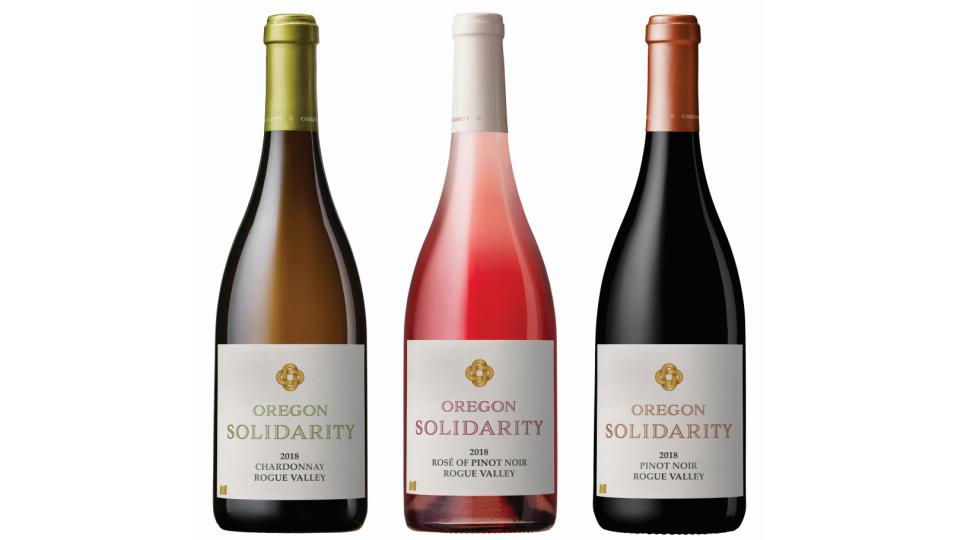How Oregon Grape Growers Banded Together In Support

A coalition of wine grape growers in Oregon banded together to save grapes from canceled contracts. The coalition made three Oregon Solidarity vintages, a ‘Rosé,’ a ‘Chardonnay’ (released in May), and a ‘Pinot Noir’ (coming this summer). (Photo: Oregon Solidarity)
While California’s wine industry leads the U.S., Oregon’s is nothing to scoff at. More than 700 wineries and 30,000 acres of vineyards grace the state’s diverse geography, making it well-suited to many different varieties.
But concerns of smoke taint from last year’s wildfires threatened to put many of the state’s growers out of business.
Last fall, preparations for harvest were going as usual for Quail Run Vineyards, until co-owner Michael Moore received a letter from California-based Copper Cane Wines and Provisions canceling its order due to smoke taint. Moore sells to about 40 wineries and every other one had accepted the fruit. About 10% of his acreage was suddenly unaccounted for. He was shocked.
“By the time they sent the letter, it was late September and all of the fruit was ripe so we had no time to look for other buyers,” Moore says. “We were left high and dry with all of that fruit. Grapes are a high-maintenance crop. You put a huge amount of time and work into them, and we were going to have to eat all of that cost. It was a huge hit.”
Quail Run Vineyards wasn’t the only vineyard to contract with Copper Cane; about 15 other vineyards also received cancelation letters. Some had an even higher percent of acreage tied up in the contract, and the cancelation threatened to put them out of business.
Hearing other growers were also in trouble, Moore decided to reach out to Willamette Valley Vineyards, a winery he had worked with for more than 20 years. He contacted Winery Director Christine Clair to see if she was looking to buy any more fruit.
“The timing of the call really couldn’t have been worse,” Clair says. “We were in the middle of harvesting and our winery was at capacity, processing as much fruit as we could possibly harvest every day. In addition, yields were above average.”
But when Moore explained the fruit surplus was due to a blanket cancelation that affected a number of other vineyards, and that the cancelation cited smoke taint, he sparked Clair’s curiosity.
“It really piqued my interest because we had been harvesting from his vineyard for the last two weeks and hadn’t seen any smoke impact on the wine grapes,” she said. “Our winemaker confirmed this.”
After receiving Moore’s call on a Thursday, Clair wanted to further investigate. She spent the rest of the weekend contacting each affected grower to find out how much surplus fruit they had and to learn about their situations.
“A lot of growers were sharing devastating stories about how many are family farms. Not getting paid for a whole vintage when they’ve already sunk the costs into farming would mean they’d have nowhere to turn,” Clair says. “Bankruptcy was brought up in two conversations; it was heartbreaking. Naturally, it was enough to make me want to do something.”
Jumping to Action
Willamette Valley Vineyards decided to take in as much fruit as it had space for, paying the contracted rate for the fruit and urging other winemakers to do the same.
“Essentially I was trying to run a grape matching service over that weekend,” Clair says. “But by the end of Sunday, I just realized what a small dent we had made in the 2,000 tons of canceled fruit. We were getting short on time before the fruit became too ripe and unfit for making wine.”
But in her search, Clair spoke with Ed King of King Estate Winery. King suggested another approach.
“He’s a real visionary for the Oregon wine industry and often has these wonderful out-of-the-box ideas,” Clair says. “He realized the industry couldn’t do enough by just bringing in extra fruit.”
King suggested teaming up to make a series of wines together, calling it the Solidarity Vintage. The coalition for this Oregon Solidarity project would pay full price for the grapes and produce wines to sell, donating proceeds back to Rogue Valley Vintners, the nonprofit Oregon growers association. Clair was on board, as well as The Eyrie Vineyards and Silvan Ridge Winery.
To do the vintage, the four wineries required that the grapes they took in be tested at local, third-party labs. These tests measure levels of guaiacol and 4-methylguaiacol, chemical compounds produced by fires.
“I was fearful that when you get a large cancelation like this it can really impact the reputation of the region and vintage,” Clair says. “But that is not what we found. The grapes only showed low levels of smoke impact and showed to be of sound quality.”
Copper Cane claimed to have tested the grapes as well, but Clair expressed suspicion because proof of testing was never shared with growers. In late September, Copper Cane also came under investigation for allegedly using misleading labels for two pinot noir brands. Shortly after, it sent the letters to growers canceling orders. Copper Cane said it performed the testing in a California lab, which seems improbable to Clair due to the time it would take to transport grapes from one state to another, and the short time frame between the initial investigation and sending the cancellation letters.
“This was unprecedented here in Oregon,” she said. “Whatever happened, it just doesn’t sit right with me because when we’re working with a grower, we treat it like a long-term partnership. We know a grower puts all their cost into farming those grapes — thousands of dollars an acre. Then, just days before the scheduled pick date, you cancel without providing any financial assistance or even a conversation? Doing it through a letter? That’s not how the Oregon wine community has ever worked.”
Moore also noted the cooperative spirit of the Oregon wine industry and sees the cancelation as an example of how California’s more corporate wine environment takes a different approach.
It’s a Collaboration
“In Oregon, we have a collaborative relationship, but Copper Cane didn’t feel the same responsibility and commitment to the growers that Oregon wineries do,” he says. “While we’re producing 1% of the wine in the U.S., mostly through small family farms and wineries, California is producing more than 90%. It’s a more corporate model. I think a lot of what was going on was just the difference between those two models.”
After the smoke taint tests came back, the partnering wineries immediately started to rescue as many grapes as possible. The winemakers and their staffs joined in the picking because the cancelation had forced growers to let go contracted labor.
“The loss of contractor labor is just additional evidence of how a cancellation can affect a lot of people,” Clair says. “Those contract employees’ family income is determined by how many buckets of wine grapes they’re picking. They didn’t get that opportunity.”
Clair and her partners determined which wineries they’d help first using a triage model. Some larger growers had crop insurance or planned to sell the grapes to make bulk wine. Instead, the team focused on helping smaller family farms whose livelihoods were at stake.
They harvested from Oct. 4-12 until they had to make a call that the grapes were getting too ripe.
“We knew we’d be highly visible with the coalition and wanted to make the best quality of wine possible,” Clair said.
The coalition planned to produce three wines: a ‘Rosé’ (already sold out), a ‘Chardonnay’ (released in May), and a ‘Pinot Noir’ — Oregon’s leading grape (coming later this summer).
Though the vintage is sold at wineries, the largest channel for sales has been through distributors that take the wine out of state. So far, sales have exceeded expectations.
“Our distributor in Oregon said they’ve never seen a wine release this big,” Clair says. “The response when we announced this project was amazing. So many people stepped forward to help, including many consumers. I was getting emails every day from parts of the country I didn’t even think would know our story. That’s what gave us the confidence to make so much wine and do this in a big way.”
Although the coalition is donating back proceeds, winemakers also got something valuable out of the project. “Making wine together has been a great experience,” Clair says. “You usually don’t get the opportunity to work with four talented winemakers. Everyone was so open, offering best practice and lots of laughs. It was a fun time.”
Even with the project’s success, Moore says, unfortunately, the coalition couldn’t rescue all of the grapes, and some growers still face financial challenges. He said the area’s changing climate will continue to be an issue, particularly when it comes to smoke taint.
“I think everyone is trying to understand smoke taint,” he says. “There are no officially set standards. Most wineries in Oregon don’t see it as an issue until it’s at a much higher level, but it’s a challenge we’re going to be facing more and more. We have much drier years and it’s just the beginning of what we’ll be dealing with in the future.”










